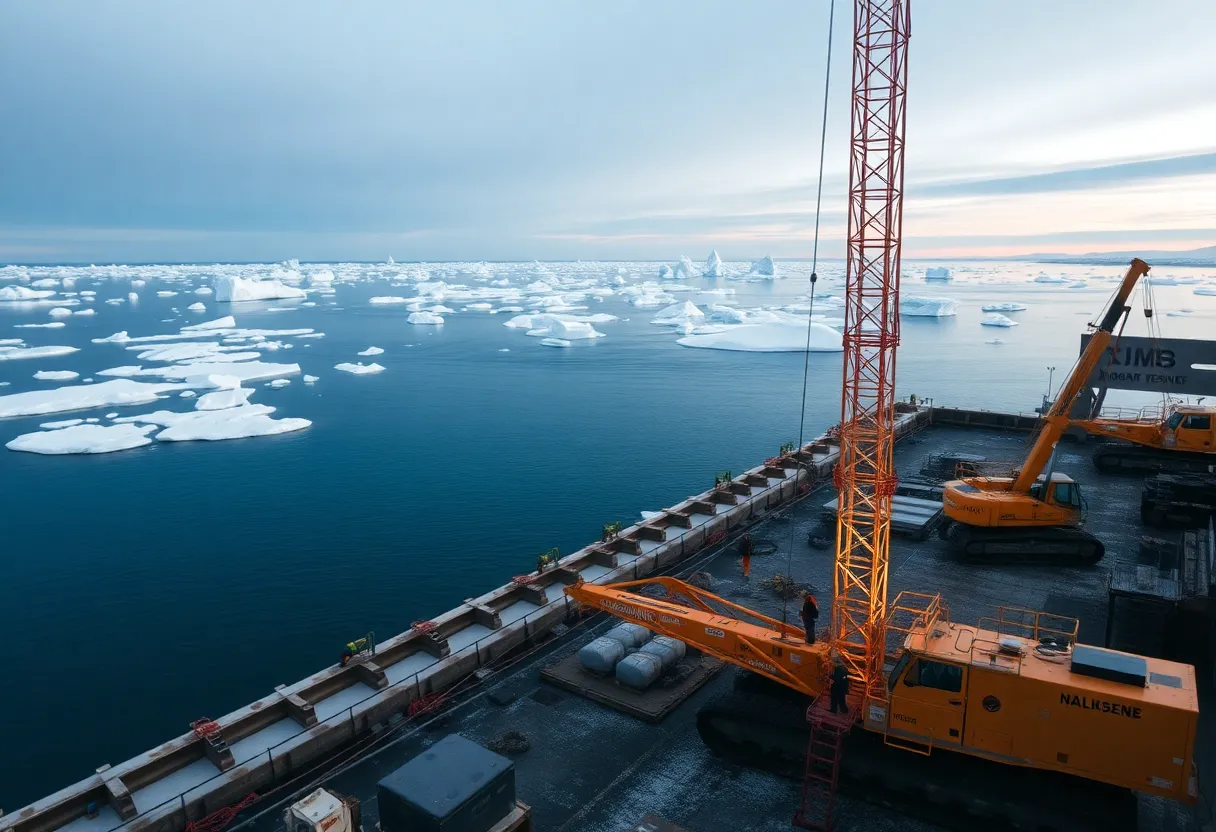Nome, Alaska, August 25, 2025
News Summary
After nearly two decades of planning, construction of America’s first Arctic deepwater port in Nome, Alaska, is set to begin. The project, awarded to Kiewit Infrastructure West Co., aims to improve maritime access and ensure operational capabilities in the Arctic region. With an investment of $399.4 million, the port will enable larger vessels to operate, enhancing both public safety and military presence as shipping activities in the region increase. Future phases are planned to expand the port further, improving access to essential maritime operations.
Nome, Alaska – Construction for America’s first Arctic deepwater port is officially set to begin after nearly two decades of planning. With a construction contract awarded to Kiewit Infrastructure West Co., headquartered in Vancouver, Washington, the project aims to improve maritime access and operational capabilities in the Arctic region.
The U.S. Army Corps of Engineers has initiated the first phase of the port development, known as Phase 1A, with an expected completion date of September 5, 2029. The awarded contract totals $399.4 million and is classified as a firm-fixed-price agreement following prior bids exceeding the allocated budget that forced a cancellation of earlier solicitations.
For the revised plans, Phase 1A will involve extending the existing west causeway by 1,200 feet and providing an additional 600 feet of dock space. In contrast, the original proposal intended to extend the causeway by 3,400 feet, which was ultimately deemed too ambitious. Subsequent development, known as Phase 1B, is set to add another 1,870 feet to the causeway.
Ultimately, this project is designed to create a deep-water basin with a depth of minus 40 feet, which will significantly enhance the port’s capacity. Presently, the port can only accommodate vessels with an 18-foot draft, which limits accessibility to larger maritime vessels. Notably, critical Coast Guard icebreakers, such as the Healy and Storis, cannot access the port due to their larger drafts of 29 and 34 feet, respectively. Future vessels like the Polar Security Cutter and the Arctic Security Cutter will also benefit from improved access.
Project Significance and Future Phases
The development of the Port of Nome is crucial for improving public safety and increasing military presence in the Arctic, as Alaska’s infrastructure is closely tied to the needs of both civilian and military operations. As the region experiences an increase in shipping activity—evident in the rise from 340 vessels in 2016 to 665 vessels last year—the port’s renovations will facilitate essential maritime operations.
Following Phase 1A, additional construction phases are planned to further develop the port: Phase 2 is geared for bidding in May 2026, Phase 1B in 2028, and the concluding phase by 2030. Each subsequent stage will include further dredging, additional extensions to the causeway, and the construction of a second causeway and breakwater.
At present, Nome lacks a physical connection to Alaska’s broader road network, complicating port operations and limiting transportation of goods and services. Thus, the expansion of the Port of Nome represents a vital step towards bolstering the state’s infrastructure to support increased maritime traffic in the challenging Arctic environment.
Conclusion
The construction of the Arctic deepwater port is expected not only to enhance Nome’s operational capabilities but also to play a pivotal role in the future of Arctic shipping and military operations. With significant completion timelines set, Nome is on its way towards becoming a crucial hub for maritime activities in the Arctic.
FAQ
What is the purpose of the new deepwater port in Nome, Alaska?
The new port aims to improve access for larger vessels, enhancing public safety and military presence in the Arctic region due to increased shipping activities.
What are the phases planned for the port construction?
The construction will occur in multiple phases, starting with Phase 1A, expected to be completed by September 2029, followed by Phase 2 in May 2026 and Phase 1B in 2028.
How has shipping activity changed in the Bering Strait?
Shipping activity in the Bering Strait has increased significantly, rising from 340 vessels in 2016 to 665 vessels last year, necessitating improved port facilities.
Key Features of the Nome Deepwater Port Project
| Feature | Description |
|---|---|
| Project Name | Nome Arctic Deepwater Port |
| Contractor | Kiewit Infrastructure West Co. |
| Total Cost for Phase 1A | $399.4 million |
| Completion Date for Phase 1A | September 5, 2029 |
| Current Vessel Draft Capacity | 18 feet |
| Future Deep-water Basin Depth | Minus 40 feet |
| Projected Phase 1B Size | 1,870 feet extension |
| Recent Vessel Traffic | 665 vessels last year |
Deeper Dive: News & Info About This Topic
HERE Resources
Additional Resources
- High North News: US Awards Construction Contract for First Phase Expanding Nome Arctic Deepwater Port
- Wikipedia: Nome, Alaska
- ENR: Kiewit Wins $400M Contract for Alaska Port Upgrade
- Google Search: Nome Arctic deepwater port
- Akbiz Magazine: $400M Contract for Kiewit to Build Phase 1A of Port of Nome Modification
- Encyclopedia Britannica: Deepwater Ports
- Anchorage Daily News: $663M Arctic Port Delayed Frustrating Nome Officials and Alaska Congressional Delegation
- Google News: Nome Arctic port expansion
Author: STAFF HERE PHILADELPHIA WRITER
The PHILADELPHIA STAFF WRITER represents the experienced team at HEREPhiladelphia.com, your go-to source for actionable local news and information in Philadelphia, Philadelphia County, and beyond. Specializing in "news you can use," we cover essential topics like product reviews for personal and business needs, local business directories, politics, real estate trends, neighborhood insights, and state news affecting the area—with deep expertise drawn from years of dedicated reporting and strong community input, including local press releases and business updates. We deliver top reporting on high-value events such as Mummers Parade, Philadelphia Flower Show, and Thanksgiving Day Parade. Our coverage extends to key organizations like the Greater Philadelphia Chamber of Commerce and United Way of Greater Philadelphia, plus leading businesses in telecommunications, food services, and healthcare that power the local economy such as Comcast, Aramark, and Children's Hospital of Philadelphia. As part of the broader HERE network, we provide comprehensive, credible insights into Pennsylvania's dynamic landscape.





